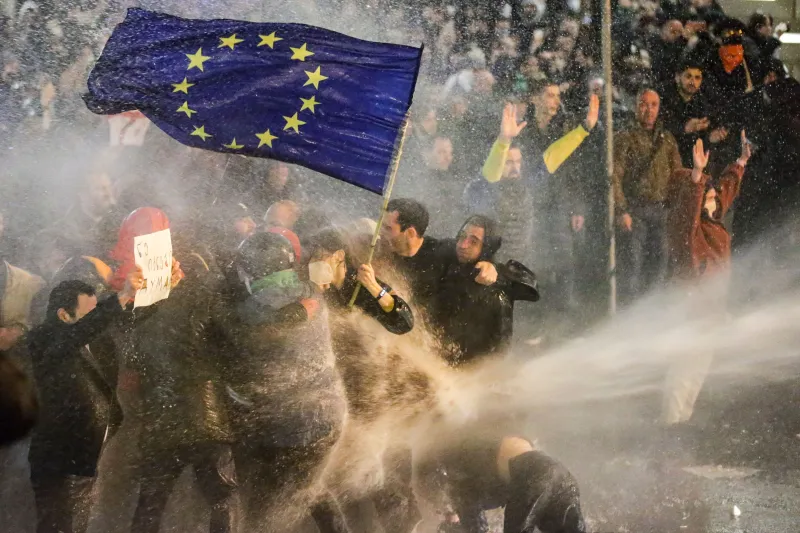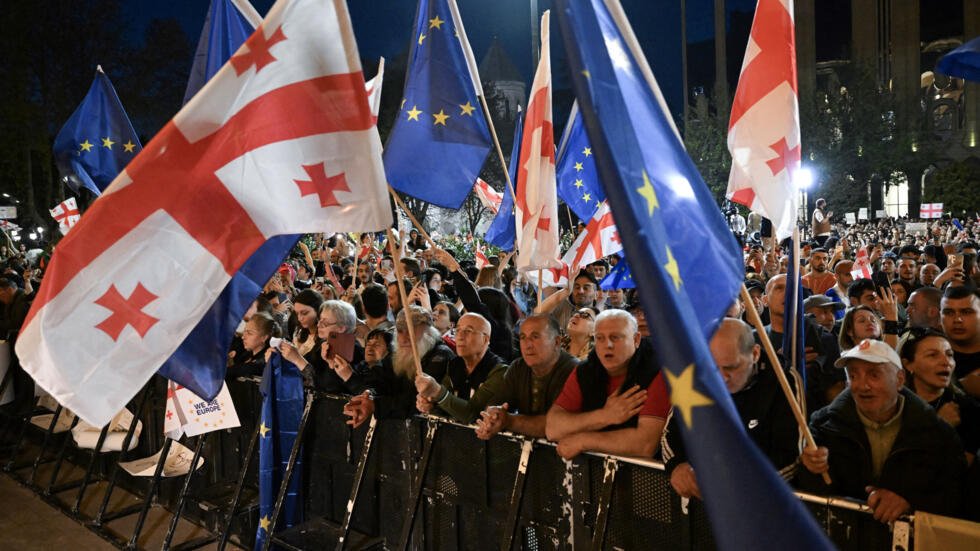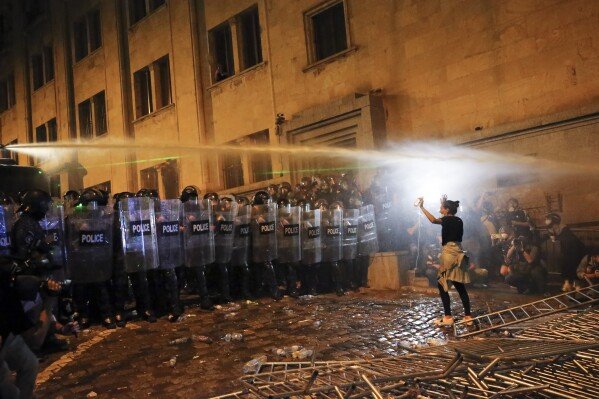In recent months, Georgia has been engulfed in significant political unrest, sparked by the parliament’s passage of a controversial “foreign agents” law. This legislation mandates that media outlets and civil society organizations receiving over 20% of their funding from foreign sources must register as agents of foreign influence. Critics argue that this law is a direct copy of Russia’s restrictive legislation, which has been used to clamp down on dissent and suppress political opposition.
Despite numerous warnings from international allies, the ruling party, Georgian Dream, pushed forward with the legislation, leading to a massive public outcry. Protesters, many of whom are young and disillusioned with the current government’s trajectory, have flooded the streets of Tbilisi in what has become one of the largest series of demonstrations since the country gained independence from the Soviet Union.
Key Figures and Entities
Georgian Dream Party and Bidzina Ivanishvili: The Georgian Dream party, currently in its third term, is said to be under the significant influence of Bidzina Ivanishvili, a billionaire who made his fortune in Russia during the 1990s. Ivanishvili’s influence over the party has been a point of contention, with accusations that he has strategically placed loyalists in key government positions. Critics argue that Ivanishvili’s connections and interests align more closely with Russia than with Georgia’s pro-Western aspirations.

President Salome Zourabichvili: Although the President of Georgia, Salome Zourabichvili, has promised to veto the bill, her power is limited as the parliament, controlled by Georgian Dream and its allies, can override her veto. This political maneuvering has added to the public’s frustration and sense of powerlessness.
Protesters and Civil Society: The protests have seen significant participation from grassroots activists and civil society organizations. Notably, these protests have not been orchestrated by any single political leader or party, but rather represent a broad coalition of citizens united against the perceived erosion of democratic freedoms. Among the prominent voices is Giorgi Iashvili, a young cybersecurity professional and former reservist, who views the law as part of a larger Russian hybrid warfare strategy against Georgia.
The “Foreign Agents” Law and Its Implications
The “foreign agents” law requires any organization receiving over 20% of its funding from abroad to register as an agent of foreign influence. The Georgian government has staunchly defended the law, likening it to the U.S. Foreign Agents Registration Act (FARA). However, U.S. officials and international critics reject this comparison, pointing out that the context and enforcement of the Georgian law are far more restrictive and punitive.
The law primarily targets NGOs and media outlets that receive funding from Western sources, including U.S. and European Union democracy assistance programs. By imposing these requirements, the government aims to increase transparency, but critics argue it is a thinly veiled attempt to stifle dissent and reduce the influence of pro-democracy forces within the country.
Public Response and Protests in Georgia over Foreign Agent Registration Act
Since the law’s introduction, public discontent has been palpable. Tens of thousands of Georgians have taken to the streets, with protests intensifying after the law’s passage. The demonstrations have been marked by clashes with riot police, resulting in numerous arrests and reports of police brutality.
The protesters, many of whom are young and hopeful for a European future, have been vocal in their opposition to the law, viewing it as a step backward for Georgian democracy. They argue that the law not only undermines their country’s democratic institutions but also threatens its aspirations for closer integration with the European Union.
International Reactions
The international community has responded with concern and criticism. The European Union has stated that the law is incompatible with Georgia’s longstanding bid to join the bloc. The EU granted Georgia official candidate status last year, and the passage of this law casts doubt on the country’s commitment to European values and democratic principles.

U.S. officials have also expressed strong opposition to the law. During a visit to Georgia, U.S. Assistant Secretary of State Jim O’Brien warned that the U.S. could impose travel restrictions and financial sanctions against individuals involved in the law’s implementation and any associated violence against peaceful protesters. He also hinted that the $390 million allocated to Georgia this year could be reviewed if the country is perceived as moving away from partnership with the West.
Domestic Political Dynamics
Within Georgia, the passage of the law has further polarized the political landscape. Georgian Dream leaders have depicted the protesters as violent mobs and insisted that the bill is aimed at increasing transparency. However, opposition figures and civil society leaders argue that the law represents an autocratic shift and a betrayal of the country’s pro-Western aspirations.
Helen Khoshtaria: Leader of the Droa opposition party, Khoshtaria has been a vocal critic of the law, framing it as part of a broader struggle for the survival of Georgia’s democratic identity. She accuses Ivanishvili and Georgian Dream of jeopardizing the country’s future by aligning more closely with Russia.
Giorgi Vashadze: Leader of the Strategy Agmashenebeli opposition party, Vashadze echoes similar sentiments, emphasizing the widespread desire among Georgians to join the European Union and reject Russian influence.
Broader Implications
The controversy over the “foreign agents” law is not just about the legislation itself but about the broader direction of Georgian politics and society. It highlights the tension between pro-Western and pro-Russian factions within the country and raises questions about the future of Georgian democracy.
Hybrid Warfare and Russian Influence: Many Georgians, like Giorgi Iashvili, see the law as part of a broader Russian strategy to exert influence over Georgia through non-military means. This includes disinformation, influence operations, and economic leverage. The law, in their view, is a tool to weaken Georgia’s democratic institutions and make it more susceptible to Russian control.

European Union and Western Integration: The protests and the passage of the law came at a critical time for Georgia’s relationship with the European Union. The EU’s decision on whether to formally launch accession talks with Georgia is expected later this year, and the law could jeopardize that process. For many Georgians, joining the EU represents a pathway to greater democracy, economic development, and security.
Domestic Governance and Democracy: The law has also brought issues of governance and democratic integrity within Georgia to the forefront. The Georgian Dream party’s dominance and the centralization of power under Ivanishvili have raised concerns about the erosion of democratic checks and balances. The protests are as much about rejecting the law as they are about demanding a more transparent, accountable, and democratic government.
The passage of the “foreign agents” law in Georgia has triggered widespread protests and highlighted deep-seated tensions within the country. It has drawn international condemnation and raised significant questions about Georgia’s future direction. As the protests continue and the political crisis unfolds, the outcome will have profound implications for Georgia’s democratic trajectory, its relationship with the West, and its struggle against Russian influence. The law, its implementation, and the public response underscore the critical juncture at which Georgia finds itself, torn between its aspirations for a European future and the reality of internal and external pressures.
